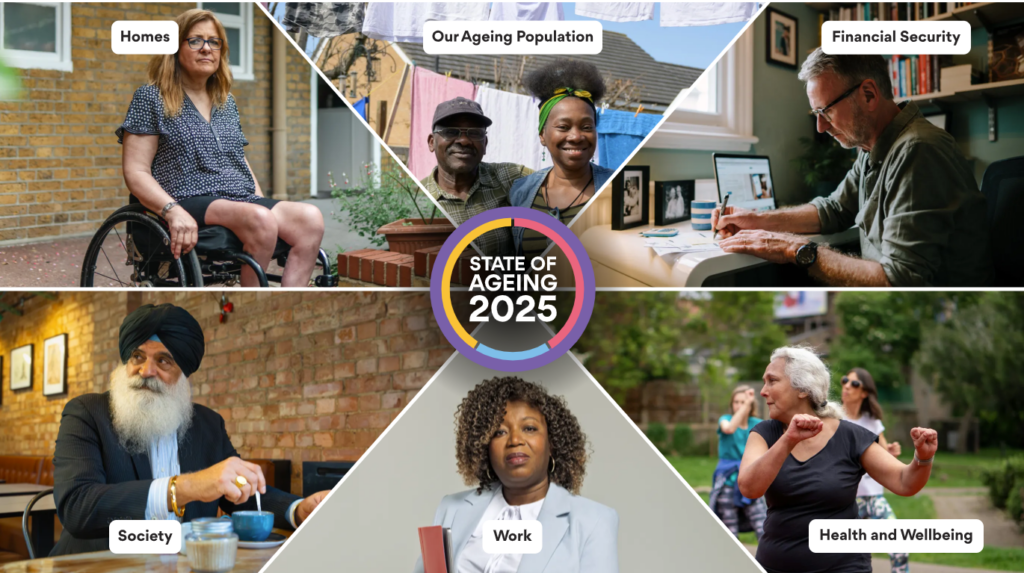The latest research by The Centre for Aging better, State of Ageing 2025 report finds that living in the poorest parts of England can cost you almost five years of your life.
We will be focussing on, and discussing the report findings in more detail over the coming weeks and months but you can click on the button below to read a detailed summary.
Ageing in place
The experience of growing older in Middlesbrough and Knowsley.
As part of our research for this report, we spoke to older people in Middlesbrough and Knowsley about their experience of growing older in areas described by official statistics as being among ‘the most deprived’ places to live in England. The fact that this deprivation affects older people is demonstrated throughout our report: there are high levels of pensioner poverty and poor housing and lower-than-average life expectancy and healthy life expectancy in these areas.
Among the people we spoke to, their experience of growing older was mixed. We heard appreciation for the services that exist in some neighbourhoods, such as libraries that provide a wide range of activities. Many people talked about a strong sense of community, where neighbours help with tasks and look after each other (the informal volunteering described in our Society chapter). At the same time, they expressed a sense of loss for the communities they had known in their youth. This sense of loss also encompassed much else that they felt was no longer part of where they lived, such as good jobs, a reliable GP practice, buses, shops and local newspapers with details of local events and activities. Their sadness at this loss is not just for them, but also for the younger generation who are missing out on education and job opportunities, youth clubs and a sense of pride in the place where they live. The effect of these losses was described in stories of increased caring responsibilities, social isolation and feeling forgotten and invisible.
Many of the people we spoke to also expressed a low level of trust that those delivering services in their area will keep any promises to improve – or even deliver a service as they are commissioned to do. We heard of streets not being cleaned, parks not maintained, buses that don’t show up, and ‘supported’ housing with only the bare minimum of support. The people we spoke to were active members of their community – age-friendly ambassadors and engaged members of local Ageing Well groups – but they described a lack of political engagement with the issues affecting them.
We asked people to describe what they would like to see in their areas to help them age well. This is what they told us:
Employment
- Good work and job opportunities (for people of all ages)
- Apprenticeships, training and education provision (for people of all ages)
- Support for carers to help them return to work when caring ends
- Options for manual workers as they age, especially given the increases to the
State Pension age
Health & Care
- Increased capacity in primary care, including dentists and GPs
- More face-to-face (technology-free) access to health services, and more straightforward technology (eg easy-to-use telephone systems)
- A consistent family doctor
- More funding for mental health
- Better communication about who you are seeing (eg nurse, doctor, pharmacist)
Green spaces
- Well-maintained and attractive green spaces near people’s homes
- Volunteer groups to help care for local green spaces
Shops & facilities
- A good range of shops in the town centre, accessible by public transport
- Bringing different facilities under one roof, such as Post Offices as community hubs, supermarkets as one-stop shops and community banks (a range of commercial banks using the same facility on different days)
Transport
- Good public transport to places where services are located and local nature spots
- Improved links for older people’s housing schemes
- Timetable coordination between different public transport services
- Easier-to-read timetables at bus stops
- Training for bus drivers to improve their support of Disabled passengers
- Measures to help people feel safe while travelling (eg te
Housing
- Houses appropriate for people to grow older in • Support for maintenance costs for homeowners (who may be asset rich but cash poor)
- More appropriate accommodation and community-based services for people who need additional support (eg because of mental health needs or substance misuse)
- More agency and control for older people living in supported housing (eg support for adaptations to meet individual needs in shared spaces)
- Reinstatement of decommissioned support in specialist older people’s
housing (eg wardens) - More extra-care housing
Community cohesion and participation
- A variety of things for older people to do, which meet a wide range of interests
- More informal contact with neighbours, and formal programmes like Good
Neighbours schemes - People taking care of where they live (eg picking up litter)
- Regeneration that takes account of the need for people to stay connected in
their communities as they age - Opportunities to bring people of all ages together
- Accessible, timely and offline information about community events
- Feeling safe and confident to move around your neighbourhood at all times of day
- A visible and responsive police presence in the local community
- Youth clubs and activities for younger people
- Being listened to – at a national and local level – and feeling like you have a stake in where you live
- Better political representation


